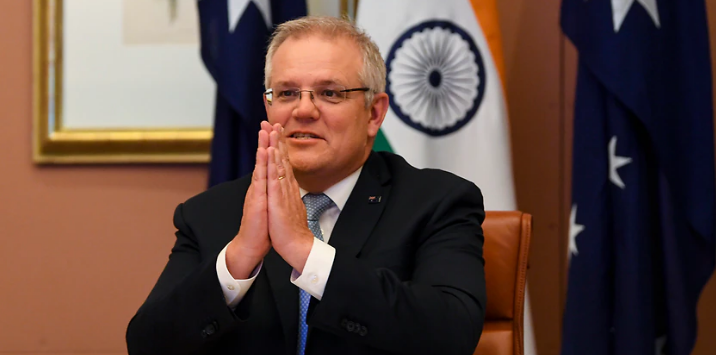Virendra Pandit
New Delhi: Austrian Prime Minister Scott Morrison recently hit the headlines for an entirely different reason—of the culinary sort. To celebrate a trade agreement with India, he cooked khichdi, a popular Indian dish made of rice and lentil, and tagged on his Twitter account this cuisine with Prime Minister Narendra Modi, who relishes it.
But khichdi, or even the Quadrilateral Security Dialogue (Quad), in which India and Australia share space with the US and Japan, is not the only reason to bring New Delhi and Canberra closer.
Recently, Australia signed a Free Trade Agreement (FTA) with India to boost and diversify trade—currently dominated by coal—from a modest A$24.3 billion in 2020. The step is viewed as Canberra’s attempt to reduce dependence on its Exim trade with China.
For many Indians also, Australia is the new US: while the Britons still make up the largest migrant group in Australia, India has dislodged the Chinese from the second spot, the media reported on Tuesday.
Between 2011 and 2021, the number of Indian-born migrants to the Down Under increased by 373,000, followed by 208,000 from China and 118,000 from the Philippines, the media reports, quoting Australian Bureau of Statistics data, said.
Now, while Britons comprise 3.8 percent population of Australia, Indians make up 2.8 percent and the Chinese 2.3 percent.
China slipped to the third spot as its ties with Australia deteriorated after the pandemic in 2020. Prime Minister Scott Morrison led calls from world leaders for an independent probe into the origins of the coronavirus that first emerged in the Chinese city of Wuhan.
An angry China responded with punitive trade actions that have hit commodities from coal to barley, lobsters, and wine, the reports said.
Now Australia is looking to reduce its dependence on China and find new partners, including India.
Like the US, Australia is also a country mostly of immigrants. But the proportion of Australia’s population who are overseas-born fell from 29.8 percent in 2020 to 29.1 percent in 2021 as Canberra shuttered borders for all foreigners allowing no new arrivals, as few Australians went overseas during the lockdown periods.
Immigration played a central role in Australia avoiding recession for 28 years until Covid-19 finally sent the economy into a reverse mode.
Experts said the expansion of India’s diaspora may become a “significant” source of human capital for Australia in the coming years.

